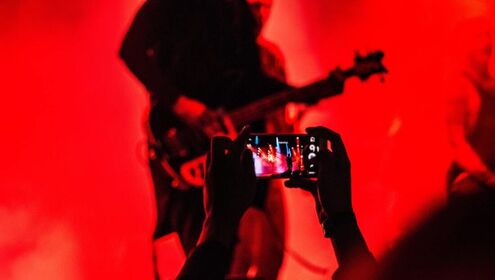|
By Anya Shukla I recently read a description for a BIPOC-centered arts criticism workshop. It specified that the goal of a critic should not be to judge a book, but to serve as a medium between a novel and the reader. Clearly, I’m doing something wrong. I admit that these reviews are judgier than they “should be,” but that’s my style, and I’m sticking to it. I do try to save my choicest commentary for books that have received critical acclaim and gained a wide following—that way, my opinion is just a drop in the New York Times/Washington Post/Goodreads-infested waters that are arts criticism. Review: Sunny, the protagonist of David Yoon’s “Super Fake Love Song,” knows he isn’t cool. His love of LARPing and “lame” clothes cement his exclusion from the heights of the high school hierarchy. So when Sunny accidentally wears his brother’s skull-adorned t-shirt—and his crush, Cirrus, thinks he’s in a rock band—he rolls with the deception in an effort to impress her. Caught in a web of lies, Sunny and his best friends (with the help of his estranged brother and actual rock singer, Gray) have a month to prepare before performing at the school’s annual talent show. Although the premise is admirable, Sunny’s constant cynicism and feeble romantic connection with Cirrus drag down this novel. And for a book that preaches a message of openmindedness, the characters in “Super Fake Love Song” never quite overcome their sin of judging others. Rating: 2/5. What I Loved: Three things and three things only. 1. Sunny and his friends’ emotional maturity. We appreciate boys who can seriously and authentically say a platonic “I love you” to one another. We appreciate an author who sees that “vulnerability” (according to mainstream society) as an ideal and chooses to exemplify it in his book. 2. A main character who is a true nerd: not a “hot nerd,” not a “jock nerd,” not a “super-buff hockey-playing alpha-male stereotype who plays video games in an effort to make his character seem more well-rounded.” I haven’t seen too many YA romances that feature a bunch of LARP-playing teens; this book dispels the myth that boys need to be conventionally attractive or play sports to get the girl. 3. The funny parts; some paragraphs in this book actually made me laugh out loud. When Sunny touchingly serenades Cirrus’ house in California in an effort to get her back… only to learn that she had left for China an hour earlier? Comedy gold. What I Didn’t Love: “Nurr” (pg. 344). “But, and, so, we got Trey” (pg. 59). “Durr hurr hurr” (pg. 120). “Gslfjk” (okay, this one wasn’t in the book… but it definitely could have been). I. CANNOT. With. This. Dialogue. Maybe, MAYBE this level of speech would have been okay in a movie script. But in a book, I unfortunately cannot condone the use of “nn” (pgs. 454, 469, 479, 548, 554, 573, 577) as part of a conversation. And that’s just the beginning. Sunny is the most cynical person I have ever read about, and honestly, I don’t see any reason for him to be. He’s living a fine life in the lap of gated-community luxury. He has two great friends. He goes to a decent school (I think? The characters only do homework once, so I can’t say). While Sunny is bullied, his “torment” feels like a plot device meant to emphasize his “nerdiness”; I only see him lightly taunted once or twice—without any mental trauma afterwards—and so don’t have much sympathy for the character. Also, Sunny and his friends are SO surface level. Sunny constantly looks down upon his classmates because they fit certain stereotypes… not to mention that he changes his entire personality, wardrobe, and backstory to attract a girl. Even Cirrus, a supposed nonconformist free spirit, is guilty of judgment. Let’s recap: Gray says 30 words (I counted) during their first interaction, and exactly four of them are directed to Cirrus. Cirrus instantly classifies him as “kind of a dork, no offense” (pg. 341). Why? Because he’s dressed in buttoned-up work clothes and argyle socks. Clothes do not a personality make. (Also, Cirrus spends the $3000 “allowance” she gets from her parents on a bouncy house party. Sunny sees this as completely logical. As someone who runs a social justice organization on a shoestring budget, I just. Cannot.) Let’s be real, the only reason Cirrus is into Sunny is because he dresses like a 1990s era rock god. They have all of one actual, serious conversation—one-sided on Cirrus’ part since Sunny can’t expose his love of LARPing—and then say “I love you” after a month of dating. And then after Sunny reveals that their entire relationship was based on a lie, Cirrus takes off for a few months and then is pretty much cool with his deception? Ew. I could go on. But I will not make you suffer any more, loyal reader. Suffice it to say that I did not enjoy this week’s reading experience. A Quote I Would Like On Goodreads: “It felt so liberating to run around and make believe back then. It had felt so cool. We really did believe we were cool—the best versions of ourselves, realized by pretending to be someone else. I wished I had stuck with it, and to hell with all the haters” (pg. 388). Next up: "Midnight Robber" by Nalo Hopkinson.
0 Comments
Your comment will be posted after it is approved.
Leave a Reply. |
Archives
February 2023
Categories
All
|

 RSS Feed
RSS Feed